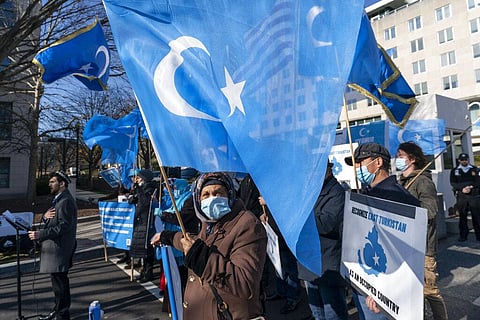

China's foreign ministry urged the United States to "immediately correct its mistakes," threatening to "make a further response," in a statement.
An estimated 20 per cent of garments imported into the United States each year include some cotton from Xinjiang.
Rights experts, witnesses and the US government say more than one million Uyghurs and other Turkic-speaking Muslims are incarcerated in camps in an effort to root out their Islamic cultural traditions and forcibly assimilate them into China's Han majority.
Washington has described the campaign as genocide.
Republican opposition has criticized the White House for slow movement on the matter.
On Thursday, White House press secretary Jen Psaki was asked about the relative discretion with which Biden signed the text, despite having made countering China a major axis of his foreign policy.
The White House released only a photo of the signing on Twitter, while Biden signed a law with cameras rolling intended to support research against a rare neurodegenerative disease.
He signs bills "off-camera sometimes (and) sometimes on camera. We support the bill and obviously, we've been leading the effort in the world to call out human rights abuses," Psaki said.
Washington has already hit some Chinese officials and businesses with sanctions and announced a diplomatic boycott of the Beijing Olympics in protest of the conditions in Xinjiang.
Beijing describes the sites as vocational training centres and says it is seeking to reduce the allure of radical Islam following deadly attacks.
Implementation of the law and the US offensive against certain Chinese economic interests is causing friction for some companies, such as US semiconductor giant Intel, which on Thursday issued an apology over a letter to its suppliers.
In the wake of the US bill's passage in the Senate, the company had asked suppliers to avoid sourcing in the region.
Following public outcry in China, the chipmaker expressed its regret for the comments in a statement posted on Weibo, the Chinese social media platform.
"We believe the private sector and the international community should oppose the PRC's weaponizing of its markets to stifle support for human rights," Psaki said, using an acronym for the People's Republic of China.
"We also think that American companies should never feel the need to apologize for standing up for fundamental human rights or opposing repression," she added.